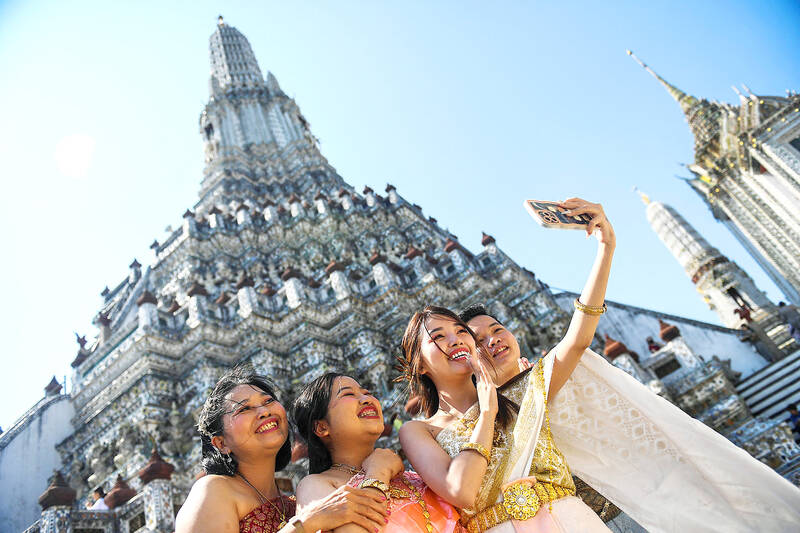Tourists from Taiwan are now eligible for visa-free entry to Thailand, Bangkok announced yesterday, as it seeks to rebuild the key tourism sector after it was battered by the COVID-19 pandemic.
Starting today, Taiwanese and Indian visitors can stay up to 30 days under a six-month trial program.
Thailand’s tourism sector accounts for almost 20 percent of GDP, but it has struggled to get back on its feet since the outbreak of the COVID-19 pandemic.

Photo: Reuters
“We will provide visa-free entry to India and Taiwan, because a lot of their people like to travel to Thailand,” Thai Prime Minister Srettha Thavisin told reporters after a weekly Cabinet meeting.
Before the relaxation, tourists from Taiwan and India had to apply for a 15-day visa-on-arrival at immigration checkpoints, presenting a bank statement and proof of accommodation.
The move comes after Thailand opened a similar visa-free scheme for Chinese tourists in September.
Thai government spokesman Chai Watcharong said authorities hoped the scheme would attract 1.4 million more tourists, generating an additional 55 billion baht (US$1.5 billion) in income.
Srettha, who took power in August following months of political wrangling after a May election, has said that boosting the tourism sector and stimulating the economy are among his top priorities.
In other news, the Chinese General Administration of Customs said that starting today, a health status declaration is no longer required for people to enter or leave Chinese borders, ending a practice that was instituted following the outbreak of the COVID-19 pandemic in early 2020.
However, those who have symptoms such as a fever, cough, difficulty breathing, vomiting, nausea, skin rashes or subdermal bleeding from unknown causes or other symptoms of transmissible disease are still required to declare their status, it said.
Additional reporting by staff writer

A magnitude 7.0 earthquake struck off Yilan at 11:05pm yesterday, the Central Weather Administration (CWA) said. The epicenter was located at sea, about 32.3km east of Yilan County Hall, at a depth of 72.8km, CWA data showed There were no immediate reports of damage. The intensity of the quake, which gauges the actual effect of a seismic event, measured 4 in Yilan County area on Taiwan’s seven-tier intensity scale, the data showed. It measured 4 in other parts of eastern, northern and central Taiwan as well as Tainan, and 3 in Kaohsiung and Pingtung County, and 2 in Lienchiang and Penghu counties and 1

A car bomb killed a senior Russian general in southern Moscow yesterday morning, the latest high-profile army figure to be blown up in a blast that came just hours after Russian and Ukrainian delegates held separate talks in Miami on a plan to end the war. Kyiv has not commented on the incident, but Russian investigators said they were probing whether the blast was “linked” to “Ukrainian special forces.” The attack was similar to other assassinations of generals and pro-war figures that have either been claimed, or are widely believed to have been orchestrated, by Ukraine. Russian Lieutenant General Fanil Sarvarov, 56, head

SAFETY FIRST: Double the number of police were deployed at the Taipei Marathon, while other cities released plans to bolster public event safety Authorities across Taiwan have stepped up security measures ahead of Christmas and New Year events, following a knife and smoke bomb attack in Taipei on Friday that left four people dead and 11 injured. In a bid to prevent potential copycat incidents, police deployments have been expanded for large gatherings, transport hubs, and other crowded public spaces, according to official statements from police and city authorities. Taipei Mayor Chiang Wan-an (蔣萬安) said the city has “comprehensively raised security readiness” in crowded areas, increased police deployments with armed officers, and intensified patrols during weekends and nighttime hours. For large-scale events, security checkpoints and explosives

‘POLITICAL GAME’: DPP lawmakers said the motion would not meet the legislative threshold needed, and accused the KMT and the TPP of trivializing the Constitution The Legislative Yuan yesterday approved a motion to initiate impeachment proceedings against President William Lai (賴清德), saying he had undermined Taiwan’s constitutional order and democracy. The motion was approved 61-50 by lawmakers from the main opposition Chinese Nationalist Party (KMT) and the smaller Taiwan People’s Party (TPP), who together hold a legislative majority. Under the motion, a roll call vote for impeachment would be held on May 19 next year, after various hearings are held and Lai is given the chance to defend himself. The move came after Lai on Monday last week did not promulgate an amendment passed by the legislature that